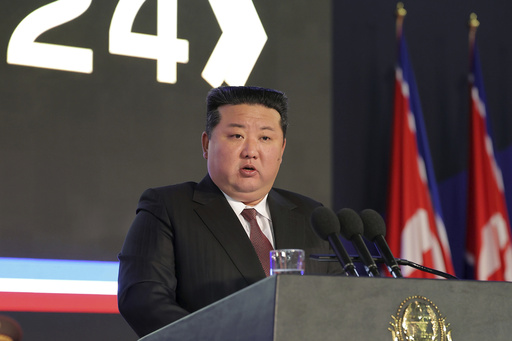
SEOUL, South Korea — North Korean leader Kim Jong Un remarked that his previous discussions with the United States only solidified Washington’s persistent animosity toward Pyongyang. He asserted that the enhancement of his nuclear arsenal is essential in addressing external dangers, as reported by state media on Friday.
During a defense exhibition held on Thursday, North Korea showcased some of its most formidable weapon systems, including intercontinental ballistic missiles aimed at the U.S. mainland, as noted by the Korean Central News Agency. Last week, during a gathering with military officials, Kim vowed to pursue a “limitless” expansion of his military nuclear capabilities.
Kim has yet to directly address the possibility of Donald Trump returning for a second term as U.S. president. Trump previously engaged in three highly publicized summits with Kim in 2018 and 2019, although diplomacy ultimately faltered due to disagreements over the exchange involving the lifting of U.S.-led economic sanctions in return for North Korea’s commitment to reduce its nuclear activities.
In his speech at the defense exhibition, Kim referred to the unsuccessful negotiations without specifically naming Trump. He stated, “We have already gone as far as possible with the United States with negotiations, and what we ultimately confirmed was not a superpower’s will for coexistence, but a rigorous stance based on force and an unchanging invasive and hostile policy,” directed at North Korea.
Kim further accused the United States of increasing military pressure on his country by enhancing military collaboration with its allies in the region and escalating the deployment of “strategic strike means,” which seemingly refers to key U.S. assets such as long-range bombers, submarines, and aircraft carriers. He urged for rapid advancements in the capacity of his nuclear-armed forces, stating that building the “strongest defense power that can overwhelm the enemy” is North Korea’s only form of security.
The expansion of Kim’s nuclear and missile programs encompasses various weapons aimed at South Korea and Japan, as well as long-range missiles capable of reaching the U.S. mainland. Experts believe that Kim’s nuclear ambitions are strategically designed to pressure Washington into acknowledging the North as a nuclear power and to negotiate concessions related to economic and security matters from a position of strength.
In recent months, Kim’s foreign policy focus has shifted more towards Russia as he seeks to bolster North Korea’s international standing, adopting the concept of a “new Cold War” and fostering alignment with President Vladimir Putin’s broader conflicts against the West.
Western nations have accused North Korea of supplying Russia with thousands of soldiers and substantial military equipment, including artillery systems and missiles to support its efforts in Ukraine. In return, Kim could potentially gain critical economic assistance and valuable technological transfers from Russia, which could enhance the threat posed by his nuclear-capable military, according to external officials and experts.
Even if Trump were to win another term, experts caution that a swift resumption of diplomacy with North Korea seems unlikely. The increasing alliance between North Korea and Russia, alongside lax enforcement of sanctions against Pyongyang, further complicates the diplomatic efforts needed to address the nuclear standoff, especially as Kim likely perceives an enhancement of his bargaining power following the rapid expansion of his arsenal in recent years.
